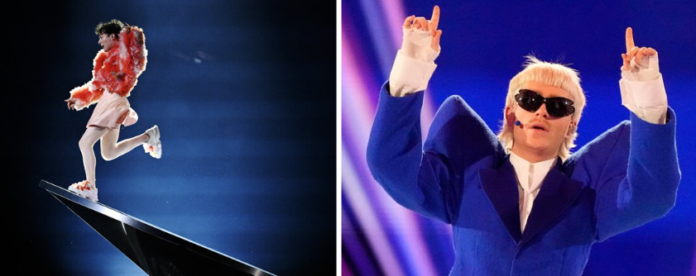
By Jessica A. Dennehy
The Eurovision Song Contest of 2024 marked the 68th edition of the iconic event, featuring two semi-finals held on the 7th and 9th of May, with the grand final taking place on the 11th of May. Malmö, Sweden, served as the host city following Sweden’s victory the previous year with Loreen’s “Tattoo,” as per Eurovision tradition. Organized by the European Broadcasting Union (EBU) and hosted by Sveriges Television (SVT), this year’s competition showcased a diverse range of musical genres, impressive skill and talent, and a butt-load of controversy, especially surrounding Israel’s participation. The EBU reported a television audience of 163 million viewers across 37 European markets, which was further supplemented by an additional 7.3 million viewers streaming online through YouTube.
The first semi-final, held on May 7th, saw 15 countries vying for 10 coveted slots to advance to the grand final. Exempt from this round of selection were the hosting nation’s act (Sweden), along with the acts from the “Big Five”–the five largest financial contributors to the EBU, namely France, Germany, Italy, Spain, and the United Kingdom. Among the fan favorites, Ireland, Croatia, and Ukraine’s representative acts successfully qualified. During their dress rehearsal, Irish representative Bambie Thug later admitted that they originally had “ceasefire” and “Freedom for Palestine” written in Ogham, an ancient Irish language, on their face and body before being forced to switch it by the EBU at the threat of expulsion. Among those not qualifying, the well-liked Mustii of Belgium was also seen with a tattoo on his forearm, which called for peace. Further memorable acts that qualified from the second semi-final were Switzerland, Greece, The Netherlands, and Israel. While the semi-finals were occurring, thousands of pro-Palestinian demonstrators, calling for a cease-fire in Gaza, marched through Malmö, the third largest city in Sweden which also happens to contain a large number of Muslim inhabitants. With increased police presence and additional security measures, many protesters, including climate activist Greta Thunberg, were escorted away.
Leading up to the final, there were various protests from Eurovision competitors against the participation of Israel’s act, Eden Golan. During the qualifier’s press conference, where all qualifying acts, in what was supposed to be a moment of global unity, sat together on a long thin table to be interviewed, Marina Satti, the Greek representative, and Dons, the Latvian representative, called for peace. During Eden Golan’s interview, when a question was asked regarding how her appearance might be perceived as threatening the security of the other participants, Golan’s PR representative, telling her she didn’t have to answer the question, was interrupted by the Dutch representative, Joost Klein, who demanded “Why not?” During Golan’s interview, Marina Satti of Greece was seen pretending to sleep, and Joost Klein of the Netherlands was seen wrapping himself in his flag to avoid acknowledging the Israeli representative.
Hours after the second semi-final, the Dutch representative Joost Klein was filmed without his consent and in turn made a “threatening movement” toward the camera. Although Dutch broadcaster AVROTROS reported that Klein didn’t touch the camera or the camera operator, the EBU decided, for the first time ever in Eurovision history, to boot and disqualify Joost Klein from the contest, citing their anti-bully policy. Never mind that reportedly, the Israeli camera delegation were repeatedly insulting, harassing, and filming competitors without their consent for the entirety of the contest. AVROTROS remarked on Joost Klein’s disqualification, calling it “disproportionate.”
The grand-final arrived without the arguably number one fan favorite there to participate in it. As per tradition, the previous year’s winner is supposed to hand off the Eurovision trophy to the next winner, but hours before the grand-final, Loreen released a statement announcing that if Israel won, they would have to receive their trophy themselves. Other previous representatives, such as last year’s Norway representative Alessandra, refused to show up to the show, citing the “inflamed situation” of this year’s contest for her absence.
For better or for worse, notoriously neutral Switzerland won the 2024 Eurovision Song contest, with the first-ever non-binary victor Nemo and their song “The Code.” Switzerland won the combined vote and jury vote, and placed fifth in the televote. Meanwhile, Croatia won the televote and finished in second place, its best result to date as an independent country. It was a hotly disputed win, with many in denial over the upset. After receiving the Eurovision trophy, Nemo apparently immediately broke both it and their thumb on stage. In a soon following press interview, when discussing how the EBU banned bringing in non-binary flags, Nemo made the statement, “The trophy can be fixed–maybe Eurovision needs fixing a little bit too, every now and then.””
